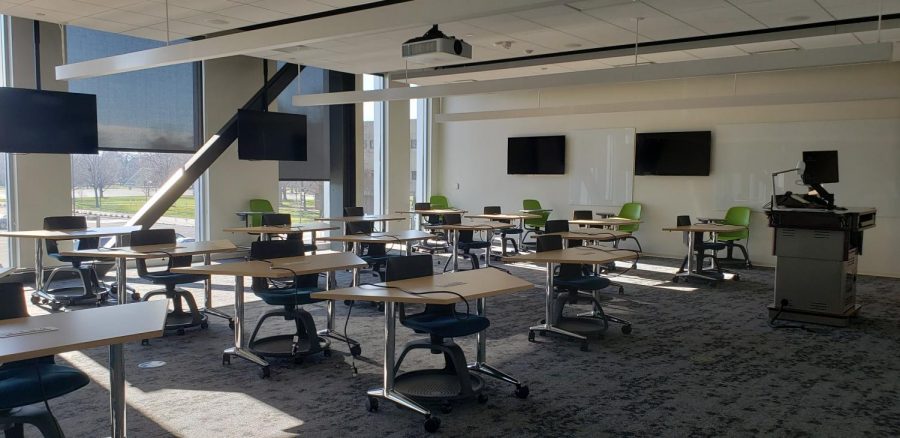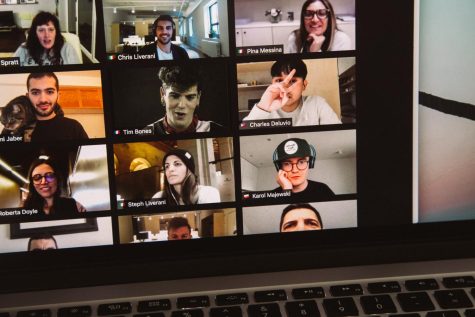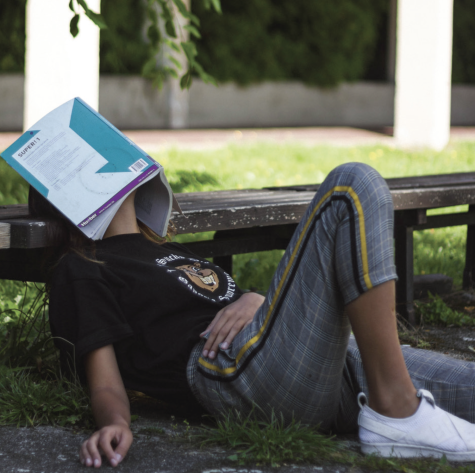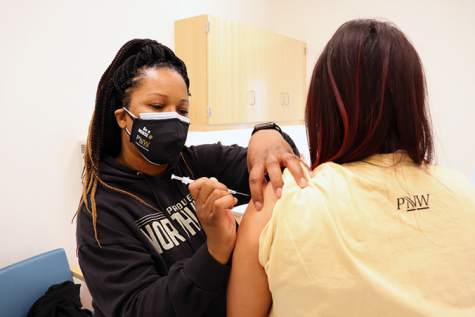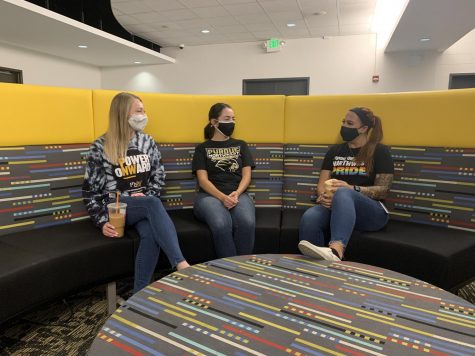Faculty ponders long-term impact of COVID
As COVID-19 defines a new normal, dramatic changes are likely in the workplace. PNW’s Bioscience Innovation Building’s state- of-the-art equipment helps train nurses to deal with challenges they will face tomorrow. Photo by Shannon Yardley
COVID-19 has changed the lives of every PNW student, but the question now is: how much has it impacted their futures?
Medical science is only starting to understand the health implication of the virus on people who have recovered from COVID-19. CDC has reported long-term health impacts ranging from ongoing fatigue and cough to serious heart, lung and kidney damage.
“[We] have no clue how long these health effects could last,” said Jodi Allen, assistant professor of nursing.
But she is absolutely sure the pandemic is taking a toll on healthcare providers like doctors and nurses.
“From a provider standpoint, we are all tired and many are experiencing burnout because of the added workload and stress,” said Allen. “I can see some long-lasting mental health impacts on health care providers because of COVID.”
She is also confident the experience has changed the way some people will access medical care.
“I can see how healthcare is making the most of technology with the use of more telehealth visits,” said Allen. “While telehealth has been around for a while, I can see that these types of patient visits will increase in the long term, which should increase overall access to healthcare.”
Employment, however, remains a big concern. Joelynn Stephen, assistant director of Career Management, foresees a lasting impact.
“While it isn’t exactly clear what the world of employment may look like after COVID, it is likely that many jobs that were once in-person, might move to remote locations,” she said. “We’ve been seeing many jobs being done, and being done well, remotely, whereas in the past, this might not have seemed possible.”
Some industries have experienced serious damage.
“Given COVID, Hospitality and Tourism Management has had a decline in job openings,” Stephen said. “However, accounting and finance are staying fairly steady, and business is always an area that is growing, evolving, and adapting to new environments to stay relevant.”
The pandemic has sped up the shift to automation for some businesses.
“Many businesses have replaced live humans with machines and computers, which will not go back, and this process was sped up because of the pandemic,” said Alan Spector, professor of sociology. “There is lasting damage to the economy that has been camouflaged by unprecedented massive amounts of spending, much of which will have to be paid back somehow.”
Broader implications also loom for personal interaction. The way humans connect and communicate have been altered entirely. People have traded face-to-face visits for Zoom calls. They have also gotten comfortable with social distancing and avoiding physical contact.
“For personal relationships, we have to consider that picture phone apps like Apple’s FaceTime, Google, WhatsApp already have workable versions to communicate face-to-face.” said Spector. “But for things like family get-togethers it can make a big difference.”
Spector also believes COVID-19 has created rifts in society.
“The pandemic has created intensified conflict between those who believe in science and those who take comfort in anti-scientific ideas and policies,” he said. “When the pandemic is over, things will somewhat return to normal, except that the gap between the rich and the rest of us, especially the lower-income, working class folks, will intensify and all these things affect the psychological processes that affect how people relate to each other.”
Bottom line: he believes the pandemic is increasing pressures on society.
“These stresses might help some people get closer together,” he said. “But they also might tear some relationships apart.”
As for PNW’s future, the university strives for students and faculty to be safe in uncertain times. That means PNW will adapt to conditions.
“We could easily [decrease density], change modality and upgrade technology if needed,” said Jacob Lenson, assistant vice chancellor for Campus Planning, Infrastructure and Facilities. “With the accessibility to technology, movable furniture, and modern classrooms, these are the active rooms we are using as a model moving forward.
“Prior priorities at PNW were focused on campus density,” he said. “Utilizing campus space in the most efficient manner, interchanging schedules to get a better utilization rate for rooms throughout the campus. But now the term ‘density’ became a negative term due to COVID.”
PNW plans to offer the four types of learning experiences in the spring 2021 semester.
“Many students enjoy the asynchronous, online courses so I think you will see more of this as time passes,” said Allen. “I can see the same class being offered both face-to-face and online to meet the needs of adult learners and their varied situations. We do this currently in the Family Nurse Practitioner program within the College of Nursing.
“Creativity is often born out of necessity and I think we are seeing that currently.”


